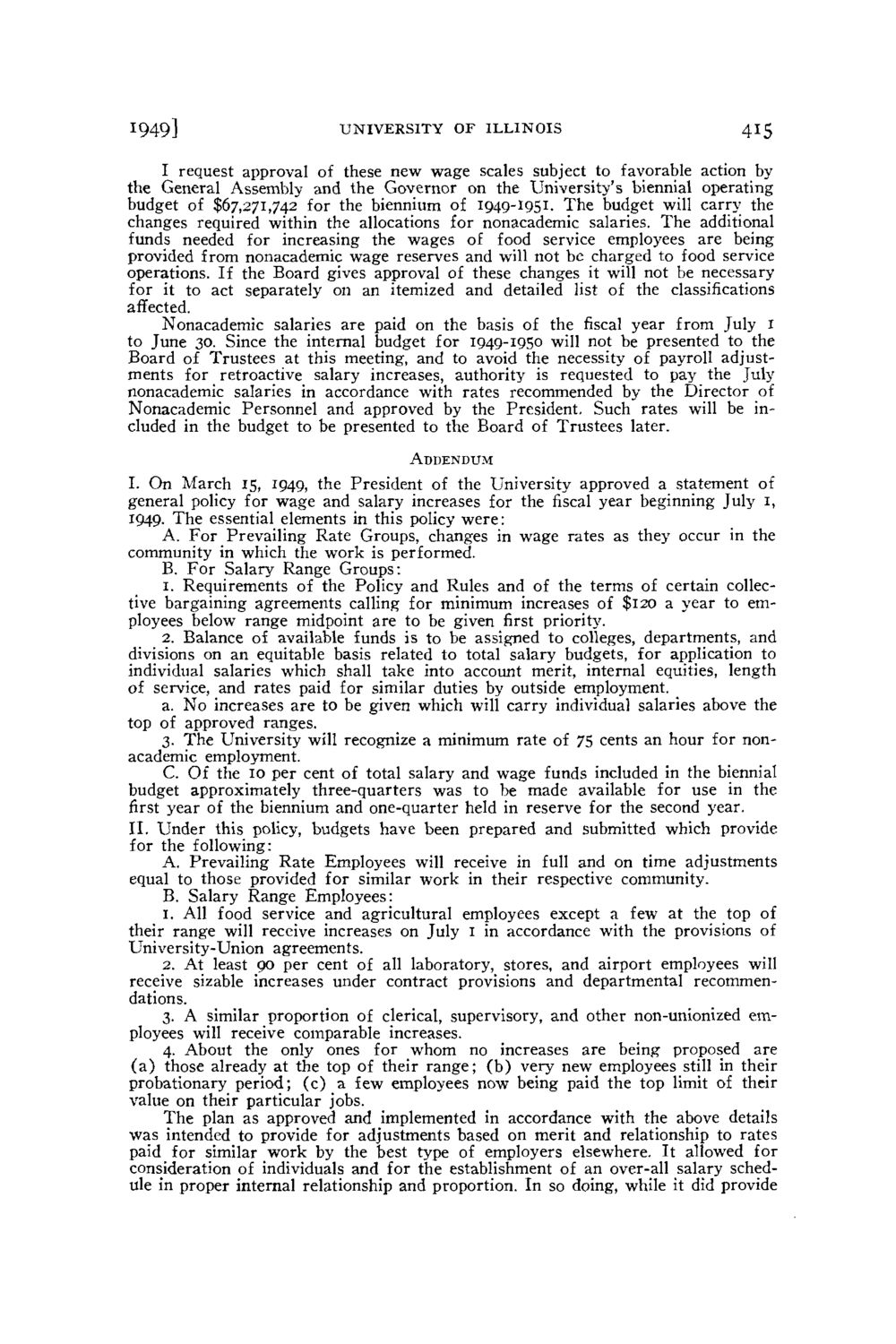| |
| |
Caption: Board of Trustees Minutes - 1950
This is a reduced-resolution page image for fast online browsing.

EXTRACTED TEXT FROM PAGE:
1949] UNIVERSITY OF ILLINOIS 415 I request approval of these new wage scales subject to favorable action by the General Assembly and the Governor on the University's biennial operating budget of $67,271,742 for the biennium of 1949-1951. The budget will carry the changes required within the allocations for nonacademic salaries. The additional funds needed for increasing the wages of food service employees are being provided from nonacademic wage reserves and will not be charged to food service operations. If the Board gives approval of these changes it will not be necessary for it to act separately on an itemized and detailed list of the classifications affected. Nonacademic salaries are paid on the basis of the fiscal year from July I to June 30. Since the internal budget for 1949-1950 will not be presented to the Board of Trustees at this meeting, and to avoid the necessity of payroll adjustments for retroactive salary increases, authority is requested to pay the July nonacademic salaries in accordance with rates recommended by the Director of Nonacademic Personnel and approved by the President. Such rates will be included in the budget to be presented to the Board of Trustees later. ADDENDUM I. On March 15, 1949, the President of the University approved a statement of general policy for wage and salary increases for the fiscal year beginning July 1, 1049. The essential elements in this policy were: A. For Prevailing Rate Groups, changes in wage rates as they occur in the community in which the work is performed. B. For Salary Range Groups: 1. Requirements of the Policy and Rules and of the terms of certain collective bargaining agreements calling for minimum increases of $120 a year to employees below range midpoint are to be given first priority. 2. Balance of available funds is to be assigned to colleges, departments, and divisions on an equitable basis related to total salary budgets, for application to individual salaries which shall take into account merit, internal equities, length of service, and rates paid for similar duties by outside employment. a. No increases are to be given which will carry individual salaries above the top of approved ranges. 3. The University will recognize a minimum rate of 75 cents an hour for nonacademic employment. C. Of the 10 per cent of total salary and wage funds included in the biennial budget approximately three-quarters was to be made available for use in the first year of the biennium and one-quarter held in reserve for the second year. II. Under this policy, budgets have been prepared and Submitted which provide for the following: A. Prevailing Rate Employees will receive in full and on time adjustments equal to those provided for similar work in their respective community. B. Salary Range Employees: 1. All food service and agricultural employees except a few at the top of their range will receive increases on July I in accordance with the provisions of University-Union agreements. 2. At least 00 per cent of all laboratory, stores, and airport employees will receive sizable increases under contract provisions and departmental recommendations. 3. A similar proportion of clerical, supervisory, and other non-unionized employees will receive comparable increases. 4. About the only ones for whom no increases are being proposed are ( a ) those already at the top of their range; ( b ) very new employees still in their probationary period; (c) a few employees now being paid the top limit of their value on their particular jobs. The plan as approved and implemented in accordance with the above details was intended to provide for adjustments based on merit and relationship to rates paid for similar work by the best type of employers elsewhere. It allowed for consideration of individuals and for the establishment of an over-all salary schedule in proper internal relationship and proportion. In so doing, while it did provide
| |